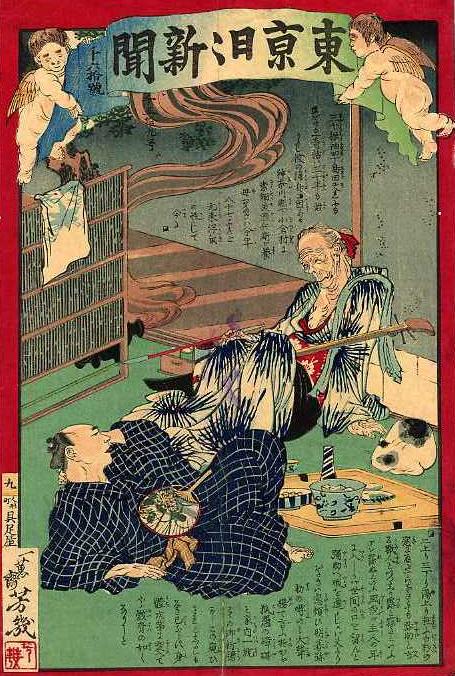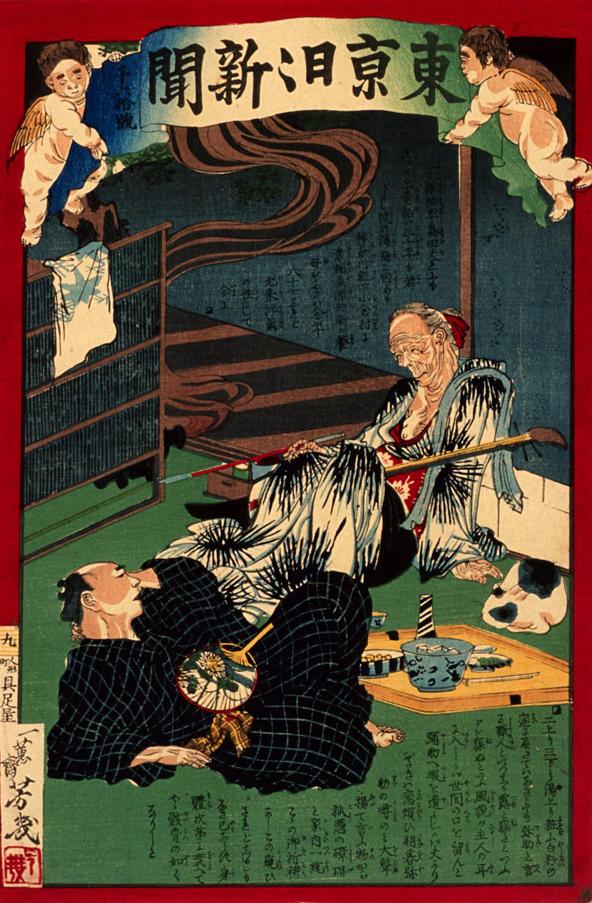Commentary
Furisode at 30, shimada at 40 reflects 三十振袖(さんしうふりそで)四十島田(ししうしまだ), marked to read "sanshiu furisode shishiu shimada" but read today "sanjō furisode shijō shimada). A "furisode" was a kimono with long sleeves worn by a young women. A "shimada" was the manner in which an unmarried woman put up her hair, as opposed the simple topknot of a married woman.
Urashima alludes to the legend of Urashima Tarō (浦島太郎), as he is usually called. Urashima, the son of a fisherman, after a brief journey to the Dragon Palace on the bottom of the sea, returns to his village to find that no one knows him. Opening the jeweled box he had been given by the daughter of the Dragon King but told never to open, he is suddenly enveloped by smoke and turns into an old man. Though only three years had passed in the sea world, some 300 years had passed on land. The story has many versions, and several variations in the number of years Urashima had aged.
capricious nature relfects 浮気()の性(さが) (uwaki no saga). The term "uwaki" is used to descibe feelings that float, waver, and change with mood and whim. It is most commonly used to mean romantic or sexual unfaithfulness, but may also characterize the wantonness of someone who likes to flirt and have affairs.
lovesickness reflects 恋煩(こひわづら)ひ (kohi-wadzurahi > koi-wazurai), meaning a worry or anxiety, or affliction or ailment, caused by being in love.
impediment of fox-possession reflects 狐憑(こり)の[石+章] 碍(しようげ) (kori no shiyouge > kori no shōge). The graphs 狐憑 represent 狐憑き (狐付き) or "kitsunetsuki" meaning "fox-possession". Here, though, they are marked to be read "kori", the Sino-Japanese reading of 狐狸, meaning "foxes and badgers".
On the print, "shō" is written with 石 (stone) as a radical on the left with 章 (shō) as a phonetic element on the right. This graph, no longer used, is today (and was also then) written 障 -- hence 障碍, which was also pronounced "shōgai", a word now usually written 障害. All these words have meant some sort of hindrance, obstruction, harm, or disorder.
Both foxes and badgers are thought to be wise and cunning, and capable of spiritually possessing people and causing them to act in odd or deranged ways.
Lovesickess ageless
Today, Otaki's carousing with Yasuke would still be regarded as socially unbecoming her age in addition to being a character defect. Some aspects of her behavior, both before and after Yasuke was removed from her life, might be attribted to a psychosis or dementia. But the emaciation following the loss of his presence in her life would be seen as a symptom of acute reactive depression -- which practically defines "lovesickness" at all ages, past and present.

